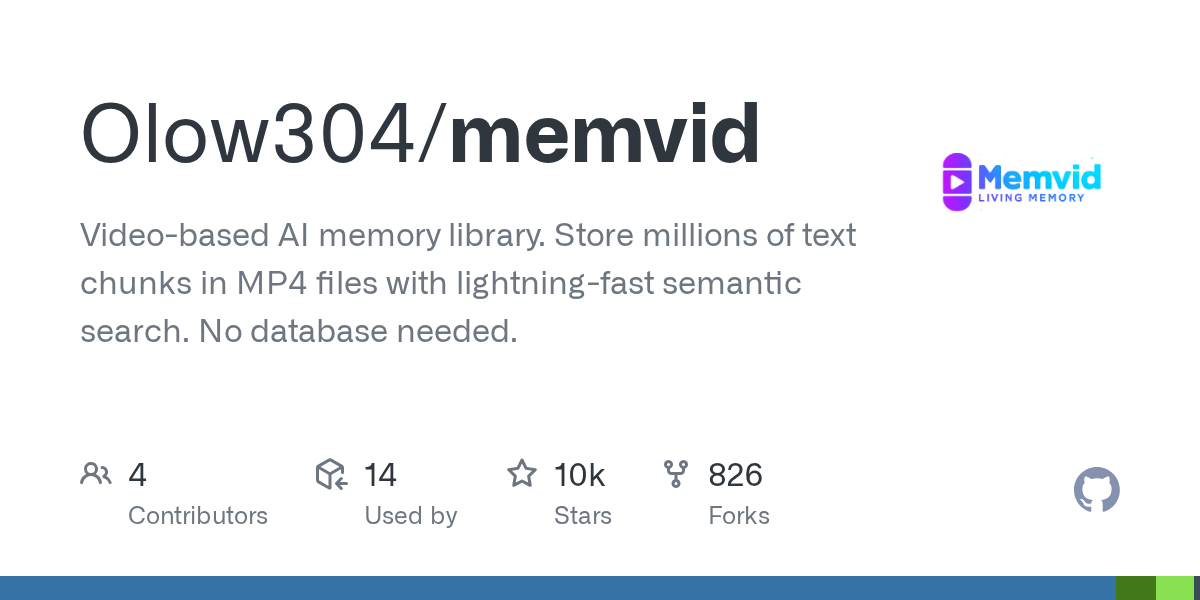Memvid: Revolutionizing AI Memory with Video Compression and Semantic Search

Summary
Memvid is an innovative Python library that transforms vast amounts of text data into compact, searchable MP4 video files. It leverages advanced video codecs to store millions of text chunks as QR codes, enabling lightning-fast semantic search without the need for traditional databases. This approach offers significant storage savings, true portability, and an offline-first design for AI memory applications.
Repository Info
Tags
Click on any tag to explore related repositories
Introduction
Memvid is a groundbreaking Python library designed to revolutionize how AI systems store and retrieve information. It allows you to compress entire knowledge bases, consisting of millions of text chunks, into standard MP4 video files. By encoding text as QR codes within video frames, Memvid achieves 50-100x smaller storage compared to traditional vector databases, all while providing millisecond-level semantic search capabilities. This innovative approach eliminates the need for complex database infrastructure, offering a portable, efficient, and self-contained solution for AI memory. Memvid v1 is currently experimental, with exciting features like a Living-Memory Engine and Capsule Context planned for v2.
Installation
Getting started with Memvid is straightforward using pip:
pip install memvid
# For PDF support, install PyPDF2 as well
pip install memvid PyPDF2
Examples
Memvid provides simple APIs for encoding text into video memory and interacting with it.
Quick Start: Creating and Chatting with Memory
from memvid import MemvidEncoder, MemvidChat
# Create video memory from text
chunks = ["NASA founded 1958", "Apollo 11 landed 1969", "ISS launched 1998"]
encoder = MemvidEncoder()
encoder.add_chunks(chunks)
encoder.build_video("space.mp4", "space_index.json")
# Chat with your memory
chat = MemvidChat("space.mp4", "space_index.json")
response = chat.chat("When did humans land on the moon?")
print(response) # References Apollo 11 in 1969
PDF Library Search
You can easily index multiple PDF files and perform semantic searches across them.
from memvid import MemvidEncoder, MemvidRetriever
# Index multiple PDFs
encoder = MemvidEncoder()
encoder.add_pdf("deep_learning.pdf")
encoder.add_pdf("machine_learning.pdf")
encoder.build_video("ml_library.mp4", "ml_index.json")
# Semantic search across all books
retriever = MemvidRetriever("ml_library.mp4", "ml_index.json")
results = retriever.search("backpropagation", top_k=5)
Why Use Memvid?
Memvid's unique approach to AI memory, leveraging video compression, offers several compelling advantages:
- 50-100x Smaller Storage: Modern video codecs are exceptionally efficient at compressing repetitive visual patterns, such as QR codes, far better than raw embeddings. This results in drastically reduced storage footprints for your knowledge bases.
- Sub-100ms Retrieval: By mapping queries to direct video frame seeks via an index, Memvid can quickly decode the relevant QR code and retrieve your text. This process avoids server round-trips, ensuring rapid access to information.
- Zero Infrastructure: Memvid operates solely with Python and MP4 files. There's no need for complex database clusters, Docker containers, or extensive operational overhead, simplifying deployment and maintenance.
- True Portability: Your
memory.mp4files are self-contained and can be copied or streamed anywhere video plays. This offers unparalleled flexibility and ease of sharing. - Offline-First Design: Once your data is encoded into a video file, all subsequent operations, including semantic search, can run entirely without an internet connection, making it ideal for embedded or disconnected environments.
- Future-Proof Compression: Memvid automatically benefits from advancements in video codec technology. Next-generation codecs like AV1 and H.266 will further shrink your memory files and improve performance without requiring code changes.
Links
- GitHub Repository: Olow304/memvid
- PyPI: memvid
Join the community, star the project on GitHub, report issues, or contribute to this exciting new frontier in AI memory!